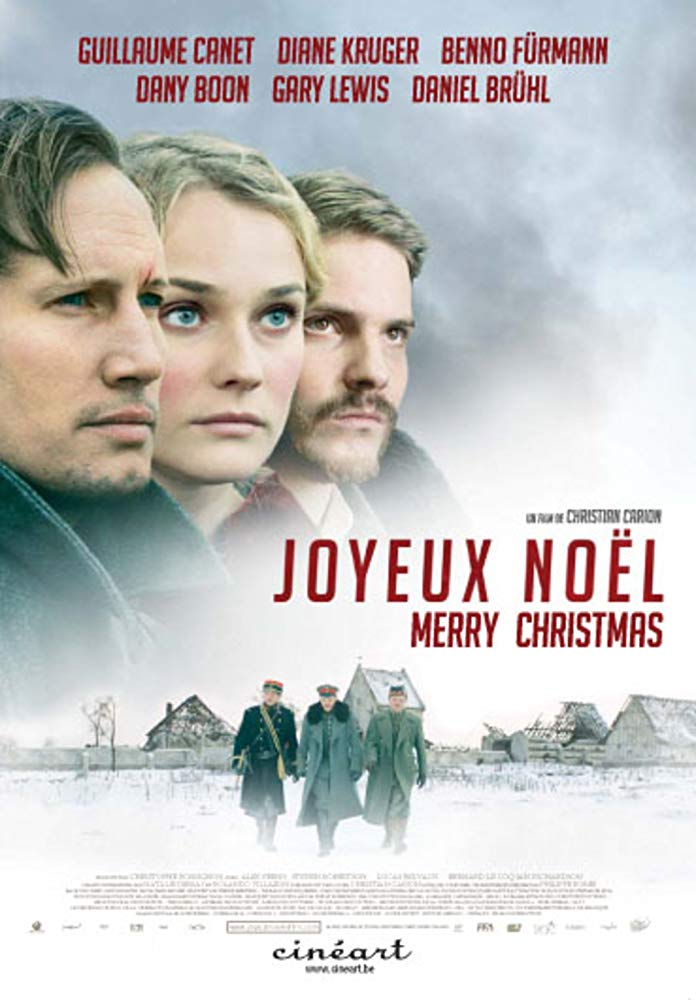Joyeux Noel, an Oscar nominee for best foreign film in 2006, is something I highly recommend for Christmas viewing. Based on the true story of an impromptu WWI truce, this film deserves to become a Christmas classic, along with the well-loved parables of redemption, A Christmas Carol and It’s a Wonderful Life.
The film’s prelude shows English school children reciting reasons why they should hate Germans, and German schoolchildren reciting their reasons for hating the English.
This early education has its effect on upcoming crops of soldiers. Hearing that Britain has entered the war, two Scottish brothers elatedly tell their village priest that they can’t wait to enlist. They feel they’re about to enter the great adventure of their lives, seemingly unaware that it might end their lives. The priest watches them with grave concern.
The boys join a Scottish battalion and are sent to France, where they join the French in fighting the Germans. In their cold, muddy trenches, the Scots, the Germans, and the French have in common their grief about fallen comrades, their physical misery, and their homesickness.
As Christmas approaches, the longing for family warmth and normal life intensifies. These soldiers have been raised with a cultural sense that hospitality and generosity are a mark of the Christmas celebration.
The Scottish priest has joined the regiment as a medic to support the boys in his parish. On Christmas Eve the groups of soldiers are each celebrating separately. Then the priest picks up his bagpipe and begins to play a song about home, and his boys start singing along. The other troops all stop and listen, understanding the emotion if not the words.
The Germans have small, lighted Christmas trees and, under the influence of the music, they move them so all the troops can see. The Germans also have a special guest, an opera star who has come to sing for them. He begins singing for his countrymen and then bravely steps out into “no man’s land,” the killing field, and sings for all the men. The soldiers are mesmerized and transformed. The leaders are moved to discuss a Christmas Eve truce, deciding that one night off from the fighting won’t matter much to the outcome of the war.
Then the enlisted men come out and talk to each other and exchange gifts: a little chocolate, a little wine. As they share their meager creature comforts, a spirit of celebration takes over. They show each other pictures of their families and become fellow human beings in each others’ eyes. Then, the Scottish chaplain holds a midnight mass (in Latin which, in that situation, is wonderfully non-partisan).
The problems come the day after Christmas. These soldiers have seen that they have more in common with each other than with the power brokers who sent them to war. They simply don’t want to shoot each other.
In one tense moment, a Scottish soldier runs out to “no man’s land” to bury his brother. The Germans are ordered to shoot him but they are reluctant. The Scottish priest rushes out waving a white flag and pulls the man off the field. Then the leaders hold another meeting and declare a truce to bury their dead. A light snowfall had partially covered the bodies, but the newly dug graves show the extent of the carnage.
When word about the impromptu truce gets out to the military, they’re quick to act, disbanding units and punishing their leaders. They understand that the spirit of brotherhood is inimical to warfare.
The Scottish priest is confronted by his Bishop about the Christmas Eve service. In his defense the priest says “these men were attracted to the altar, like to a fire in winter. … I sincerely believe that our Lord Jesus Christ led me in the most important mass of my life.” The priest is denounced and sent home and the Bishop addresses the soldiers on the importance of hating your enemies.
Some reviewers have described this movie as a “triumph of the human spirit.” But the human spirit is fallen and tends naturally to revert to an extreme and often violent tribalism – we read about it every day. What happened on that Christmas Eve in 1914 was a transcendent moment honoring the Prince of Peace.
Sharon Gallagher is the founding editor of Radix magazine and the author of Finding Faith: Life-Changing Encounters with Christ.
(Reprinted from Radix 33:3)

